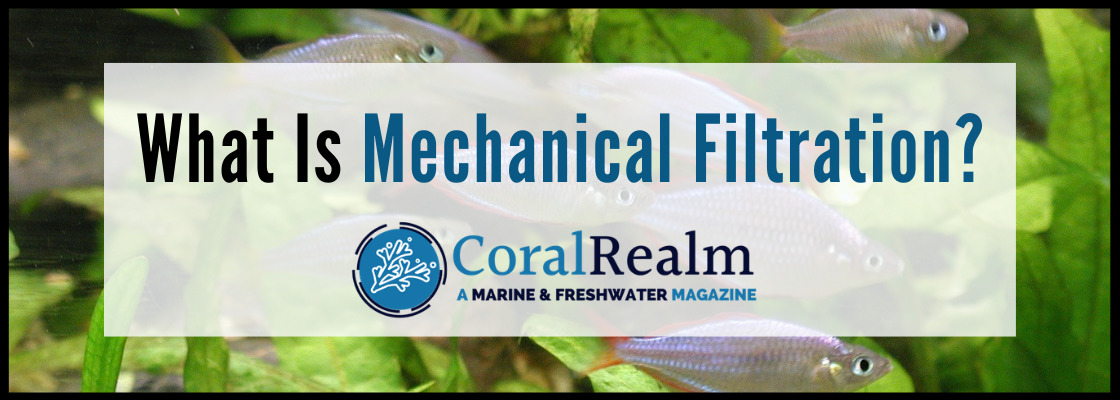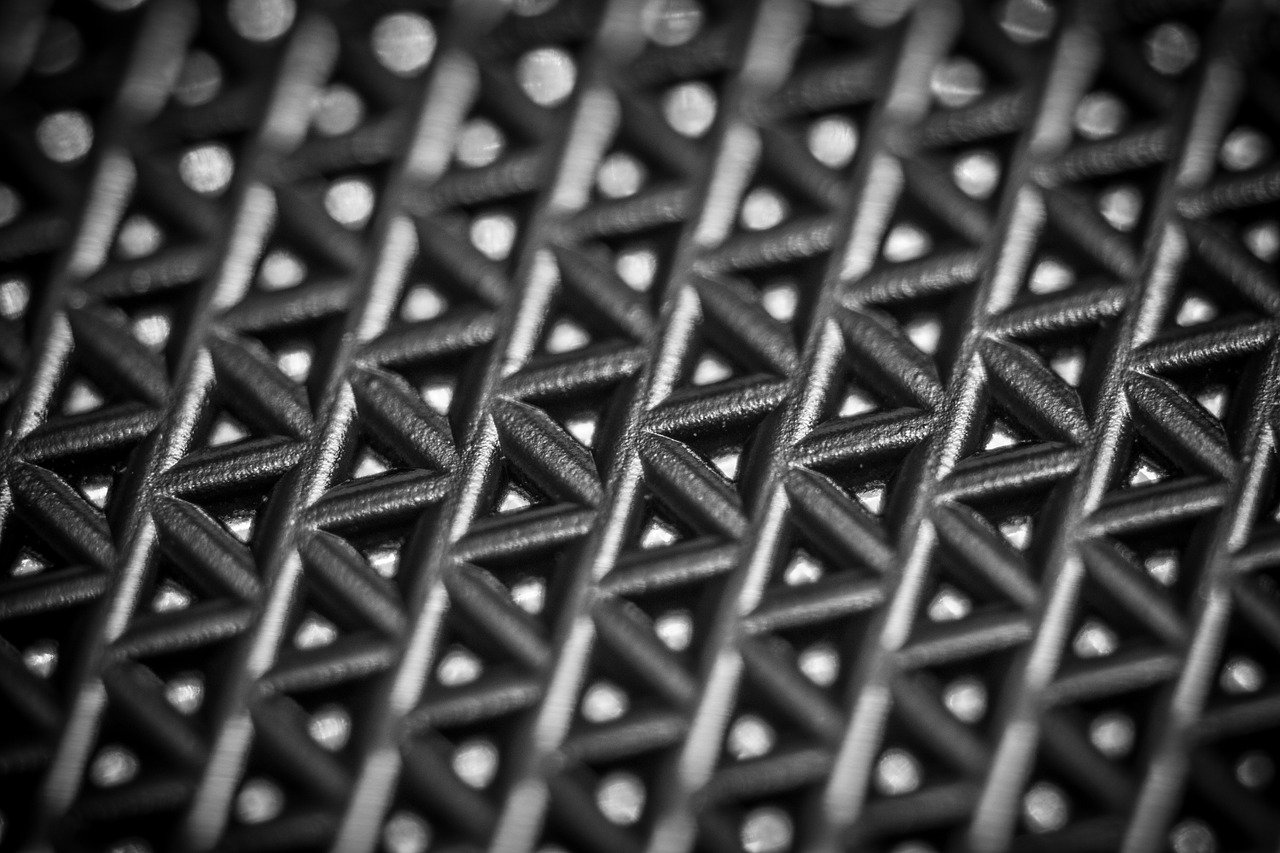Last Updated on February 10, 2023 by Matt
Every aquarium needs a filter. While you might think that a small fish tank won’t need one, it definitely does. By far the most common form of filtration is mechanical filtration.
But what actually is mechanical filtration, and how does it benefit your tank?
In this article we will look at what benefits mechanical filtration actually gives to your aquarium, and run through some of the most common mechanical filter media you can get.
IN THIS ARTICLE
So What Is Mechanical Filtration?

Essentially mechanical filtration works to remove the larger more visible bits of debris and detritus from the water column.
It is found in all filters, even the most basic of setups. It is the most common of the three filtrations types, the other two being biological filtration and chemical filtration.
A mechanical filter traps debris particles that are found in the water column as the water passes through. Similar to pouring water through a sieve.
Mechanical filtration is normally found in the form of porous pads or sponges. These pads sit in the filtration unit and as the tank water is drawn through the unit they trap the debris. The newly cleaned water is then pumped back into your tank, without the detritus.
So mechanical filters will remove the bigger floating bits of debris which accumulate in the water column. This debris can include fish poo, uneaten food, scales, dead or decomposing plant leaves, dust etc.
If you don’t have mechanical filtration for your tank this debris will continue to build up in your tank and it can be very dangerous. Not only will your water turn cloudy and murky, but dangerous chemicals such as ammonia and nitrite will be released as this debris starts to decompose. Nitrate levels will rise as well. While using a product like the Python water changer to conduct water changes can help, it will be fighting a losing battle.
As you can imagine, filtering out all this gunk from the water means the mechanical filter can get pretty dirty pretty quickly. As such they need regular maintenance. Leaving mechanical filters too long will mean that the debris trapped there will start to decompose, the same as if it is left in the tank itself. This deposition can release same harmful ammonia, nitrite, and nitrate into the water column. Rising nitrate levels can cause algal blooms as well as nitrate poisoning.
You do need to take care when you clean the filter. Don’t use tap water! Use water from your tank to clean the mechanical media, and if the media has disintegrated then replace it. Don’t replace it all at once though! Using RODI water is another great option.
Tap water can kill beneficial bacteria which grow in the porous media, and also introduce harmful chemicals to the water column. These are the same bacteria which reside in the biological media, so offer an additional filtration step. Killing these bacteria can lead to a spike in ammonia, nitrite, and nitrate. Replacing all mechanical media at the same time can have the same effect.
Types of Mechanical Filtration
There are different types of mechanical filtration available. These different media types are designed to capture different sized debris particles.
These differing media types are graded on how porous they are.
Coarse media have large pores, while fine media have small pores.
This means that coarse media will capture large debris particles and let through small particles, which are then picked up by the fine media.
You wouldn’t be the only person to think; well if the fine media filters out what is not by the coarse media, why even bother with the coarse media at all?
Well the answer is because if you didn’t have the coarse media the fine media would become clogged very quickly.
Coarse media takes much longer to clog, and is also much easier to clean. You don’t need to be too careful in how you clean coarse media as they are often much tougher then fine media.
If the worst happens and your filter clogs, your tank may quickly deteriorate very quickly. The water flow, and oxygen supply, to the biological and chemical media will be stopped. The beneficial bacteria will die and the water in your tank will quickly fester.
To prevent clogging for as long as possible coarse media are often utilized as a pre-filter, installed before the fine media.
This stops the larger debris from getting to and clogging the fine media. It will also save you money as you won’t have to replace the media as often!
Many aquarists use this technique and have multiple layering of their mechanical filtration, ranging from very coarse to very fine.
There are up to five different grades of mechanical media, but there are four main grades:
Coarse mechanical filter media
Coarse mechanical media usually consists of a pad made from stiff material such as plastic.
Normally you can see through these pads, so they are very porous and let through all but the largest of floating debris.
You may find that coarse media can be either coarse or very coarse, but they both work to capture the larger debris particles.
This media is mostly used as a pre filter option, to take the larger particles from the water and preventing clogging in the latter filter stages.
You don’t want coarse media in the filter by itself; if you have a small filter with room for only one mechanical filter pad you will be wanting the medium media.
Medium mechanical filter media
Medium mechanical filter media is the standard media that is usually provided with most filters.
As the name suggests, this level of media covers the happy medium. Unlike with coarse media, you could only use this media in your filter and you would be ok. You wouldn’t have incredibly clear water as the finer debris particles will still be let through. But your water will be noticeably cleaner and clearer than using the coarse media.
However you could get away with only this level of media and cleaning the tank regularly, including using a good aquarium vacuum cleaner.
Fine mechanical filter media
Fine mechanical filtration media captures the debris which passes through the coarse and medium media.
When you have a fine media installed you will see a significant improvement in water quality and clarity.
It can’t be used by itself in a filter though, as it will clog very easily. It needs to be used behind a pre filter, or in line with a coarse or medium pad in front catching the larger debris.
Very fine mechanical filter media
This grade of mechanical filter is also commonly called filter floss or water polishers.
They capture the smallest particles of debris that are found in the water column. These particles may not even be visible without a microscope!
This media will make your water extremely clear, as it is removing these micro-particulates. Along with biological and chemical filtration, using a very fine mechanical media can really make the difference to your tank.
If you decide to use very fine mechanical media in your filter, you want to make sure that you have coarser media installed before. If you only have very fine media it will get clogged extremely quickly, as everything that goes through will be captured.
Best Mechanical Filter Media

There is a huge array of mechanical filter media out there. It’s incredibly difficult to narrow down the best filter media due to the amount that is out there, and it also depends on your filter system.
If you have a Fluval filter for instance, you should get Fluval filter media as they offer a wide variety and they will fit perfectly in their own filters. The other brands have a similar broad range of mechanical media.
The following are a select few of the best mechanical filter media available online at the moment.
Coarse Mechanical Media
This coarse filtration media by JIH can be cut into any shape to fit any filter. Very handy especially when it comes to slightly strangely shaped filter baskets!
The coarseness of the media makes it perfect for pre filter use, or just before a finer media pad.
Bacteria will also find a home in this sponge, so you will also benefit from added biological filtration.
Bonded Filter Pad
This bonded filter pad by Aquatic Expertsprovides excellent mechanical filtration. It has both a coarse and fine media bonded together.
The coarser part is designed to capture larger debris which is floating in the water column, so this should be the first part the water comes into contact with. A finer mechanical media is provided by the other side which captures smaller particles.
This dual design is brilliant for smaller filters which may not have space for a pre filter section or multiple filter pads.
Polishing Filter Pad 50 Microns
This polishing filter pad by Aquatic Experts is aimed at catching the tiny floating debris that will flow straight through other mechanical media. The pores are an extremely small 50 microns.
In case you don’t know how small this is, 50 microns equates to 0.05 mm, or 0.02 inches. Almost no floating debris will be able to get through this media!
The media can be cut into any shape so it can be used in any filter no matter of shape or size.
A word of warning however; if you don’t use a sufficient pre filter before installing this polishing filter pad you will find that it gets clogged extremely quickly. Even with a sufficient pre filter you should clean this pad regularly.
Is Mechanical Filtration Needed in Saltwater Aquariums
Mechanical filtration is an absolute necessity in freshwater aquariums, but it is a little more complex in saltwater tanks.
If you have a reef tank you may not want to run a mechanical filter 24/7. Or at least not fine mechanical media.
Corals are an animal, which have tentacles to catch passing food particles and prey. Yes they also have zoonotic photosynthetic bacteria which provide energy, but they also need to capture food.
If you are constantly running a mechanical filter it can remove the food in the water column that the corals need. Normally a coarse mechanical media will capture the large debris while letting through the small particles the corals will want however.
A saltwater tank needs a protein skimmer. Protein skimmers, as the name suggests, remove proteins and other physical materials from the water column.
This isn’t to say that a mechanical filter has no place in a saltwater reef tank.
Without a mechanical filter you may find that debris is building up quicker than you would like. If you install a filter with mechanical filtration but find it is causing some issues with the coral, you can always run it intermittently.
Many reef tank owners will do this. Often the main filter will have a coarse mechanical filter, and then biological and chemical filtration. This coarse media will remove the larger debris from the water but will let the smaller bits through. Every so often a secondary filter will be turned on, which has medium and fine mechanical media. This will capture the smaller debris and prevent it from building up, but will allow the corals time to feed.
Author’s Note: A good saltwater reef tank will use a happy combination of live rock, filtration, and protein skimming to ensure high quality and clean water.
Conclusion
Mechanical filtration is the most common type found in aquarium filters.
Mechanical filters capture the debris and detritus that is found floating in the water column. If left untreated this debris will build up and start to decompose, releasing harmful chemicals into the tank.
There are four main types of mechanical filtration; these are found as coarse, medium, fine, and very fine filtration media.
The best filtration media depends on your personal setup and filter type. However you can find some of the better all round options above!










